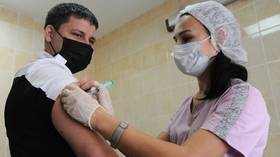Hot on the heels of Sputnik V, Russia’s 2nd Covid-19 vaccine ‘EpiVacCorona’ set for release in December, say developers

With Sputnik V set for launch after its phase-three trial is completed, another Russian Covid-19 vaccine, EpiVacCorona, will be made available to the public next month. It is hoped that mass inoculation can begin in the New Year.
Developed by Siberia’s Vector Center, results from testing are ready to be presented, and an international publication is being sought to publish them, according to the head of the research body’s zoonotic infections and influenza department.
“I think that in 2021 it will appear in almost all regions of Russia,” Alexander Ryzhikov explained. “The earliest date of receipt of the vaccine in civil circulation is December 10. In the future, mass vaccination will begin in 2021.”
On November 17, EpiVacCorona began third-phase, post-registration trials. Batches of the formula were delivered to nine medical centers around the country, with 30,000 volunteers due to receive the jab. Another separate trial for over 60s is taking place simultaneously, which will involve 150 people.
Once the vaccine is received, a second booster jab is necessary six to 10 months later, with the current plan to revaccinate patients again every three years.
“As for the immune response that it creates, there is a lot of hope for the vaccine, in contrast to the immunity formed as a result of infection,” Ryzhikov explained. “Immunity created as a result of infection and recovery has already been shown to be insufficient. After five to seven months, antibodies disappear.”
Unlike many other potential Covid-19 vaccines, EpiVacCorona does not need to be stored at sub-zero temperatures. The vector vaccine can be stored between two and eight degrees, significantly reducing the logistical burden. In contrast, the formula proposed by American pharmaceutical giant Pfizer needs to be kept at -70 degrees Celsius.
On October 14, EpiVacCorona became the second coronavirus vaccine registered in Russia. The first, named Sputnik V, is currently undergoing a trial involving 40,000 volunteers. Preliminary results have shown that the vaccine is 92 percent effective. Other manufacturers around the world have also published results of their vaccine trials, with both US vaccines, developed by Pfizer and Moderna, showing themselves to be around 95 percent effective.
Think your friends would be interested? Share this story!













